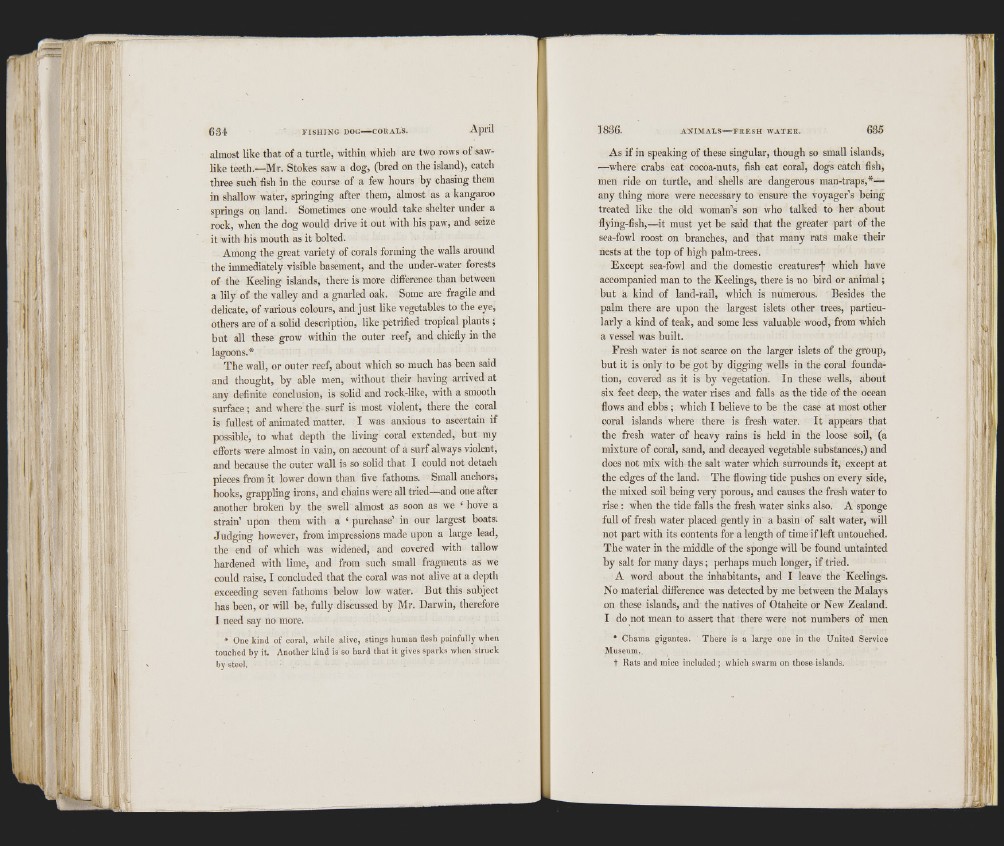
■'7
V
!'il0
almost like that of a turtle, -within which are two rows of sawlike
teeth.—Mr. Stokes saw a dog, (bred on the island), catch
three such fish in the course of a few hours by chasing them
in shallow water, springing after them, almost as a kangaroo
springs on land. Sometimes one would take shelter under a
rock, when the dog would drive it out with his paw, and seize
it with his mouth as it bolted.
Among the great variety of corals forming the walls around
the immediately visible basement, and the under-water forests
of the Keeling islands, there is more diiference than between
a lily of the valley and a gnarled oak. Some are fragile and
delicate, of various colours, and just like vegetables to the eye,
others are of a solid description, like petrified tropical plants ;
but all these grow within the outer reef, and chiefly in the
lagoons.*
The wall, or outer reef, about which so much has been said
and thought, by able men, without their having arrived at
any definite conclusion, is solid and rock-like, with a smooth
surface ; and where the surf is most violent, there the coral
is fullest of animated matter. I was anxious to ascertain if
possible, to what depth the living coral extended, but my
efibrts were almost in vain, on account of a surf always violent,
and because the outer wall is so solid that I could not detach
pieces from it lower down tban five fathoms. Small anchors,
hooks, grappling irons, and chains were all tried—and one after
another broken by the swell almost as soon as we ‘ hove a
strain’ upon them with a ‘ purchase’ in our largest boats.
Judging however, from impressions made upon a large lead,
the end of which was widened, and covered with tallow
hardened with lime, and from such small fragments as we
could raise, I concluded that tbe coral was not alive at a depth
exceeding seven fathoms below low water. But this subject
has been, or will be, fully discussed by Mr. Darwin, therefore
I need say no more.
* One kind of coral, while alive, stings human flesh painfully when
touched by it. Another kind is so hard that it gives sparks wlien struck
by steel.
As if in speaking of these singular, though so small islands,
—where crabs eat cocoa-nuts, fish eat coral, dogs catch fish,
men ride on turtle, and shells are dangerous man-traps,*—
any thing more were necessary to ensure the voyager’s being
treated like the old woman’s son who talked to her about
flying-fish,—it must yet be said that the greater part of the
sea-fowl roost on branches, and that many rats make their
nests at the top of high palm-trees.
Except sea-fowl and the domestic creatures# which have
accompanied man to the Keelings, there is no bird or animal;
but a kind of land-rail, which is numerous. Besides the
palm there are upon the largest islets other trees, particularly
a kind of teak, and some less valuable wood, from which
a vessel was built.
Fresh water is not scarce on the larger islets of the group,
but it is only to be got by digging wells in the coral foundation,
covered as it is by vegetation. In these wells, about
six feet deep, the water rises and falls as the tide of the ocean
flows and ebbs ; which I believe to be the case at most other
coral islands where there is fresh water. I t appears that
the fresh w'ater of heavy rains is held in the loose soil, (a
mixture of coral, sand, and decayed vegetable substances,) and
does not mix with the salt water which surrounds it, except at
the edges of the land. The flowing tide pushes on every side,
the mixed soil being very porous, and causes the fresh water to
rise : when the tide falls the fresh water sinks also. A sponge
full of fresh water placed gently in a basin of salt water, will
not part with its contents for a length of time if left untouched.
The water in the middle of the sponge will be found untainted
by salt for many days; perhaps much longer, if tried.
A word about the inhabitants, and I leave the Keelings.
No material difference was detected by me between the Malays
on these islands, and the natives of Otaheite or New Zealand.
I do not mean to assert that there were not numbers of men
• Chama gigantea. There is a large one in tlie United Service
Museum.,
t Rats and mice included ; which swarm on those islands.
0' I M
• M:;.
f ?
ft
■I'l
ift.
[i f l ì